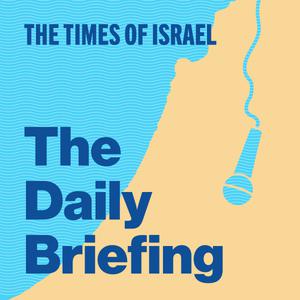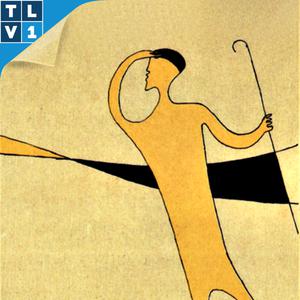
Haaretz Weekly
Haaretz
From Haaretz – Israel's oldest daily newspaper – a weekly podcast in English on Israel, the Middle East and the Jewish World, hosted by Simon Spungin.
- 27 minutes 49 secondsWhat could still go wrong with the Israel-Hamas cease-fire and hostage release deal?
For the first time in over a year, a deal to free the Israeli hostages held in Gaza and end the devastating war there seems imminent. The first stage of the deal will reportedly see 33 people held captive by Hamas return to Israel and a temporary cease-fire.
But much of it is still up in the air – even after it becomes final. Many factors can sabotage the deal in its planning stages or during its implementation. Haaretz correspondent Linda Dayan spoke to Haaretz's senior security analyst Amos Harel about the hurdles that remain, the future of Gaza, the fate of the hostages and the dashed hopes of Israel's radical right wing.
See omnystudio.com/listener for privacy information.
15 January 2025, 4:14 pm - 33 minutes 53 seconds'In war, there's also the psychological struggle of parents who can't provide safety'
Israelis have long prided themselves on their ability to face war and conflict with strength and resilience. But the tragedy of October 7, and the ongoing war in Gaza and attacks by Iranian proxies have challenged this ethos, says Karen Zivan, a psychologist who works in schools alongside her private practice, and the mother of five sons who have served in reserve duty during the current war.
On the podcast, Zivan talks to host Allison Kaplan Sommer about the different ways the war has taken its toll on the Israeli psyche, and how mental health professionals are coping with the enormous well of need.
Haaretz correspondent Nagham Zbeedat also joins the podcast to discuss her coverage of the worsening humanitarian crisis in Gaza, and specifically her recent article on the inability of parents of newborn babies to meet basic needs.
"When the war broke out, it was declared that Israel was going to war against Hamas and those who praise Hamas," Zbeedat said, explaining her decision to focus on the issue. "But babies had no control. Children and women are most affected by the war and they have absolutely no control... War isn't just about bombs and airstrikes, but also the psychological struggle that parents go through knowing that they can't provide a secure and safe environment for their children."
See omnystudio.com/listener for privacy information.
13 January 2025, 8:30 pm - 14 minutes 15 seconds'Israelis who served in the IDF will need to think twice about where they travel'
This week, Israel was rocked by the story of a young man who served in Gaza that went on a trip to Brazil – and found himself wanted for questioning for war crimes. He managed to flee the country before he was arrested, but questions remained: What does this mean for soldiers and reservists who fought in the war and want to travel abroad? Is this the new normal?
Haaretz correspondent Linda Dayan spoke to Amir Tibon, a senior writer and columnist for the Haaretz English edition, about efforts by pro-Palestinian groups to track Israelis who saw combat in Gaza and push for their prosecution, unwittingly aided by the soldiers themselves, who posted pictures and videos from the front, against the IDF’s orders.
See omnystudio.com/listener for privacy information.
8 January 2025, 12:18 pm - 24 minutes 30 seconds'International organizations have a shameful record when it comes to the hostages'
A year has come and gone, and Israel has worn down Hamas and Gaza and decimated the leadership and manpower of Hezbollah, achieving many of its stated objectives since the war began.
But one of the most – if not the most – pressing issue has yet to be solved. One hundred people kidnapped by Hamas and other militants in Gaza remain in captivity, over 450 days later. Each week, their families and supporters protest for their release, pleading for a deal that will see their loved ones come home and the fighting cease. But why hasn't this happened yet, and why do the negotiations keep falling apart?
Haaretz reporter Linda Dayan spoke to Daniel Shek, a former Israeli ambassador and the head of diplomacy for the Hostages and Missing Families Forum, about the negotiations, why the Israeli government won't end the war, the international community's failures and what the future might hold.
See omnystudio.com/listener for privacy information.
3 January 2025, 11:05 am - 28 minutes 19 secondsWhat was it like being Jewish in 2024: Franklin Foer, Masha Gessen, Tony Kushner and more
The turbulent events of 2024 in Israel had a significant impact around the world.
The ongoing war in Gaza and other fronts had a particularly deep and emotional effect on the lives of Diaspora Jews, who coped with angry protests against Israel on campuses and in city centers, and with soaring rates of antisemitic violence.
The new and disturbing environment ignited “a feeling of vulnerability and exile that came back to us,” said Paris Rabbi Delphine Horvilleur, one of the important voices from the Diaspora who joined the Haaretz Podcast over the course of the year.
Excerpts from the conversation between podcast host Allison Kaplan Sommer and Horvilleur, along with insights from interviews with other leading thinkers from the Jewish world like writers Franklin Foer, Ayelet Waldman, and Masha Gessen and award-winning playwright and screenwriter Tony Kushner are featured on this special year-end edition of the podcast.
See omnystudio.com/listener for privacy information.
31 December 2024, 1:44 pm - 37 minutes 31 secondsLooking back at 2024, a year very few people want to remember
In this special year-end episode, we take an in-depth look at the seismic events that shaped Israel in 2024 through the conversations on the Haaretz Podcast.
It was a year in which the shadow of October 7, 2023 and its aftermath - the death and destruction in Gaza, the hostages still held by Hamas, unprecedented fighting between Israel and Hezbollah - loomed large with the nation grappling with its most devastating multi-front war in decades.
Featuring excerpts from interviews with newsmakers and the analysis and insights of expert Haaretz journalists, we explore Israel’s journey through 2024 and its series of dramatic events and ask what has been learned - or not learned - from this ongoing crisis?
The episode includes conversations with Ambassador Dennis Ross, former Israeli Prime Minister Ehud Olmert, Jonathan Dekel-Chen - the father of an American-Israeli hostage in Gaza, and Haaretz journalists Aluf Benn, Amos Harel, Sheren Falah Saab, Amir Tibon, Ben Samuels and Dahlia Scheindlin.
See omnystudio.com/listener for privacy information.
29 December 2024, 11:05 am - 26 minutes 4 seconds'Even if he shoots me, I'll vote for him': The machine that keeps Netanyahu in power
On this episode of the Haaretz Podcast, Deputy Editor-in-Chief Noa Landau talks to host Allison Kaplan Sommer about how Israeli PM Benjamin Netanyahu has managed to stay in power since the colossal failure of October 7, 2023.
Landau explains how Netanyahu’s aggressive shaping of the narrative of October 7 and the war in Gaza and Lebanon has helped him retain his grip, with the help of the “poison machine” smearing his enemies, an issue that has been in the spotlight this week following a television exposé on the ways his wife and son directed these campaigns.
The conversation explores the judicial overhaul’s return and what it means for democracy in Israel; Israel’s rightward shift; how Netanyahu’s alliance with the incoming Trump administration factors into his plans; Israel’s growing international isolation; and recent Haaretz interviews with Netanyahu supporters who describe their devotion to him as unconditional (the article will be published in English this weekend).
See omnystudio.com/listener for privacy information.
25 December 2024, 7:55 am - 28 minutes 15 secondsAlon Pinkas on challenging the idea of Netanyahu as a master strategist of the Middle East
Haaretz senior columnist and former diplomat Alon Pinkas says that for years, Prime Minister Benjamin Netanyahu tacitly supported the continuation of the brutal dictatorship of Bashar Assad in Syria, and it is absurd for him to claim credit for helping to topple Assad’s rule by weakening the mainstays of Iranian power in the region.
“He might as well claim credit for the invasion of Normandy or the fall of the Berlin Wall or the surrender of Japan,” said Pinkas on the Haaretz Podcast. “He had nothing to do with those things. That he decimated Hamas and decapitated or degraded Hezbollah? Absolutely, but the Israeli military did that. That’s the same military he maligned and that he foul-mouthed in the days and weeks following the October 7, 2023 calamity.”
According to Pinkas, Netanyahu is suffering from “delusions of grandeur” in his attempts to convince Israelis and the wider world that he is somehow remaking the Middle East by “cherry-picking successes, ignoring failures and presenting a false narrative.”
See omnystudio.com/listener for privacy information.
22 December 2024, 11:27 am - 32 minutes 49 secondsIs Israel squandering a rare chance in Syria?
Israel, the United States, and European leaders are all missing a unique opportunity in their policy stance and behavior toward the new post-Assad regime in Syria, veteran Middle East correspondent Gregg Carlstrom said on the Haaretz Podcast.
Carlstrom, a journalist for The Economist currently based in Dubai, said that the leader of the Islamist faction that led the toppling of Bashar Assad’s regime has made it clear that he has no hostile intentions towards Israel. And yet, Israel has attacked hundreds of targets in the country, targeting weapons depots and air defense systems. Israel's decision to deploy troops on the Syrian side of the Golan Heights and seize control of a buffer zone between the two countries is, according to Carlstrom, worrying and alienating the Syrian population. "For Syrians, that looks like exploitation, not security," he explained.
Also on the podcast, German journalist Vera Weidenbach discussed how the collapse of Assad’s regime has reignited debates about Syrian refugees in Europe. With asylum applications frozen in Germany, and with other countries considering similar steps, she said refugees face mounting uncertainty as “deeply polarizing” rhetoric intensifies. "You see the far-right dominating the discourse in Germany, celebrating Assad’s fall as a reason for refugees to ‘finally go home,’ creating a toxic atmosphere."
See omnystudio.com/listener for privacy information.
17 December 2024, 1:15 pm - 28 minutes 20 secondsThe (deep) state vs. Benjamin Netanyahu: Inside the courtroom during the PM's testimony
In this episode of the Haaretz Podcast, host Allison Kaplan Sommer and Haaretz columnist Dr. Dahlia Scheindlin delve into the trial of Benjamin Netanyahu, who is facing corruption charges while continuing to lead the country at wartime. From the demonstrations outside the courtroom where Netanyahu took the stand this week, to the calculated strategies inside, they unpack the layers of drama, history, and legal maneuvering on display.
This trial isn’t just about one man - it’s about the integrity of Israel’s judiciary and the resilience of its democracy. With tensions running high and public opinion deeply divided, what’s at stake for Israel’s future?
See omnystudio.com/listener for privacy information.
12 December 2024, 11:25 am - 38 minutes 3 seconds'They're no Zionists': How Syria's rebels toppled Assad and what it means for Israel
The rapid collapse of the Assad regime in Syria has left Israel concerned about the future of what has been its quietest border in an era of continual instability and war, as Hayat Tahrir al-Sham, the rebel group that drove Assad out and has roots in Al-Qaeda and ISIS, takes charge.
"I suspect they will probably send signals to Israel directly or indirectly, that they're not interested in igniting anything there," Haaretz Podcast guest Hassan Hassan, editor-in-chief of New Lines Magazine, said.
Hassan, a Syrian-born journalist and author who has studied Islamist groups, believes that their posture towards Israel would be "cut from the same cloth" as Assad's, who "never really waged war against Israel since 1973."
Haaretz senior military analyst Amos Harel, also on the podcast, said that Israeli officials are wary of the group and its leader, Abu Mohammed al-Jolani. According to Harel, the Syrian rebel leader currently "at least pretends to to have become more of a moderate. He doesn't talk like an extreme jihadist anymore. But don't think I'm buying into this, and neither are the Israeli intelligence community and the Israeli leadership."
See omnystudio.com/listener for privacy information.
9 December 2024, 4:03 pm - More Episodes? Get the App
Your feedback is valuable to us. Should you encounter any bugs, glitches, lack of functionality or other problems, please email us on [email protected] or join Moon.FM Telegram Group where you can talk directly to the dev team who are happy to answer any queries.
 Israel Story
Israel Story
 For Heaven's Sake
For Heaven's Sake
 The Times of Israel Daily Briefing
The Times of Israel Daily Briefing
 Streetwise Hebrew
Streetwise Hebrew
 The Promised Podcast
The Promised Podcast
 The Tikvah Podcast
The Tikvah Podcast